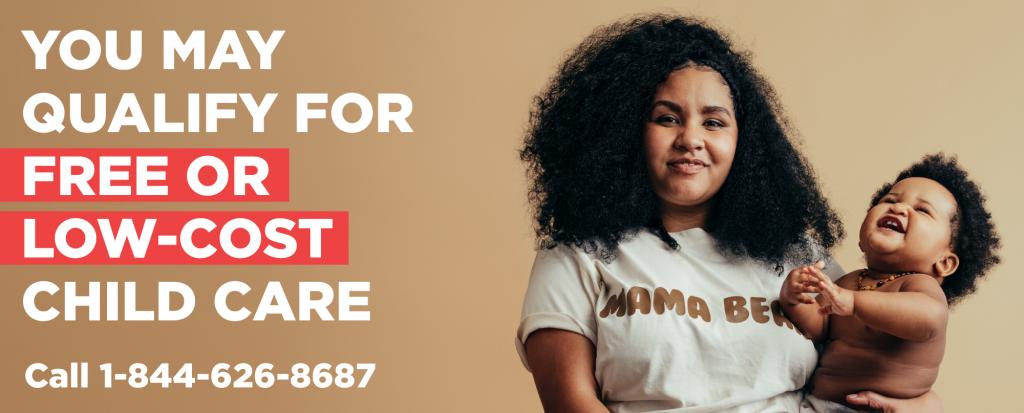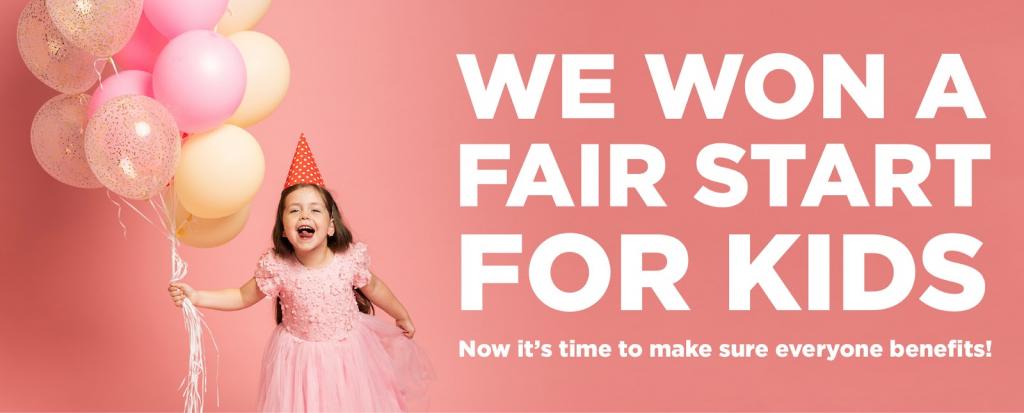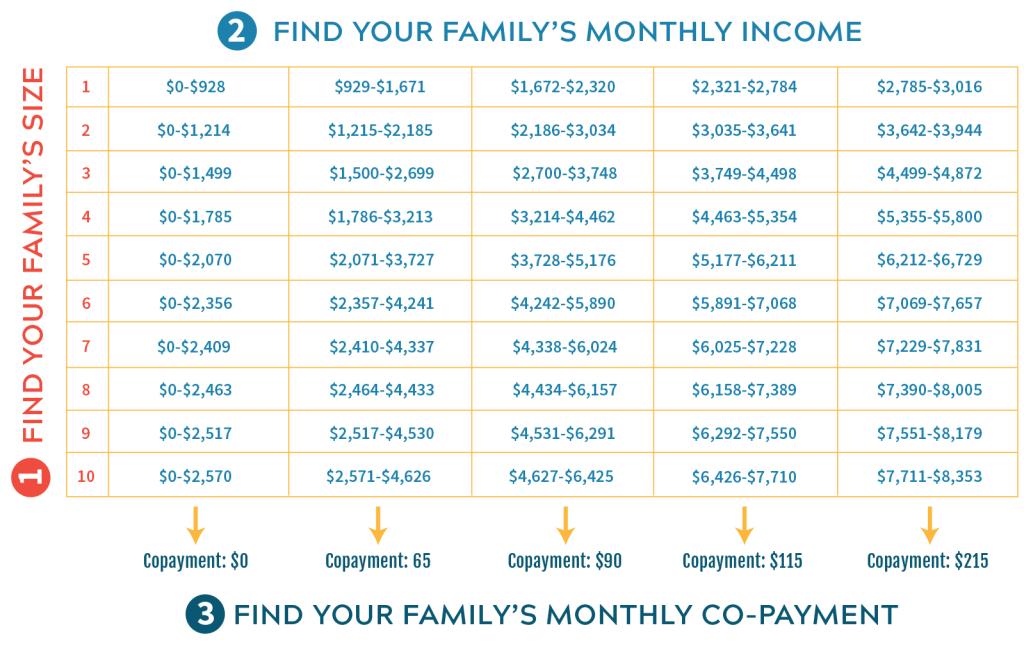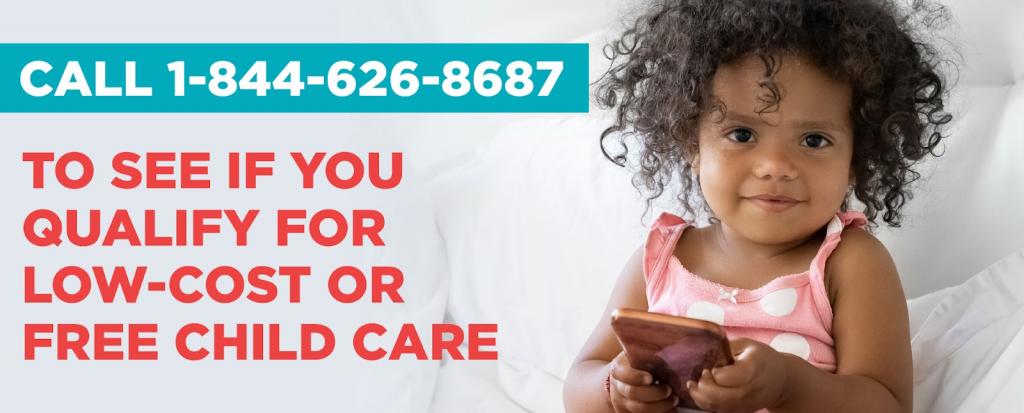You may qualify for
Free or Low-Cost Child Care!
Thanks to the Fair Start for Kids Act, financial assistance for child care has been expanded to include more families across Washington State. The good news doesn’t stop there! Co-payments have been eliminated for some families and considerably lowered for others.
Even if you haven’t qualified in the past, call the Child Care Subsidy Contact Center at 1-844-626-8687 to see if you might qualify now through expansion of our state’s child care assistance program. The easiest way to determine eligibility is by phone. Interpretation in multiple languages is available through the phone too!
Not a phone person? You can visit Washington Connection at www.washingtonconnection.org to see if you qualify and to begin an application. Things are hard right now, hopefully this information -- and more affordable child care -- will help make things just a bit easier for you and for your family.
Frequently asked questions about child care assistance:
- What is child care assistance?
- Who is eligible for child care assistance?
- Do I qualify? Is there a copayment?
- What else do I need to be eligible?
- How do I determine my family size for the purposes of applying for child care assistance?
- How is child care assistance inclusive of children with physical, intellectual, and/or developmental disabilities?
- How does child care assistance serve children and families experiencing homelessness?
- Are high school student parents eligible to receive child care assistance?
- Are college students eligible for child care assistance?
- How can I apply for child care assistance?
- What are my care options?
- How can I use child care assistance in a Family, Friend, and Neighbor (FFN) caregiving setting?
- Is there support for families and providers who choose Family, Friend, and Neighbor (FFN) care?
But first, the most frequently asked question by parents with young children all across our state: Why is child care so expensive and so hard to find?! Because we’ve failed to recognize child care as the public good that every parent, provider, and employer knows it is. Thankfully, that’s starting to change! In May 2021 Governor Jay Inslee signed the Fair Start for Kids Act (Senate Bill 5237) into law and made child care more affordable and accessible for families and more sustainable for providers. Through a new capital gains tax on the ultra-rich, affordable child care will be expanded to more families over the next decade.
We won’t stop until all families have access to affordable child care. Share your child care story and help make change for even more families!
What is child care assistance?
Washington State helps some families pay for all or part of the cost of child care! Through Working Connections Child Care, The State of Washington’s child care assistance program, the state will make payments directly to the child care provider you choose for your family. Child care assistance is paid directly to the provider through a voucher that covers the cost of the authorized attendance minus the family’s copayment.
Families participating in the Temporary Assistance for Needy Families program, our state’s welfare program, and families with very low incomes will have no co-payment -- that means zero out of pocket expenses. For all other families who qualify for initial eligibility, copayments are limited to no more than $215 per month.
Who is eligible for child care assistance?
Families who earn at or below 60% of the State Median Income may be eligible for child care assistance. For a family of three that’s $51,804 per year and for a family of four that’s $61,675 per year. What is State Median Income? It’s just a way of measuring how your income compares to the incomes of other families in Washington so that child care assistance can be prioritized for those who need it most.
Parents and caregivers who are working at licensed or certified child care centers and homes and have confirmed or verified employment recorded in MERIT may be eligible up to 85% State Median Income (SMI) with no copayment.
Providers may visit https://www.dcyf.wa.gov/services/earlylearning-profdev/merit for more information.
Families who are in their first 12 months of their state-registered apprenticeship may be eligible up to 75% State Median Income (SMI), which is currently $7,018 per month for a family of four.
Families participating in specialty or therapeutic courts and referred in court proceedings are categorically eligible; this means they are eligible regardless of income or approved activities.
Children who reside in Washington state regardless of citizenship status who are otherwise eligible.
Check out this helpful table to get a sense of whether your family might qualify based on your household’s TOTAL GROSS income (for families with two grown ups, that means adding both grown ups’ PRE-TAX incomes together):
Do I qualify? Is there a copayment?
Step 1: Find your family size on the horizontal line.
Step 2: Find your family’s monthly income before taxes on the vertical line.
Step 3: Follow the horizontal and vertical lines to the point where they meet to estimate your copayment.
What if I don’t qualify based on my income?
If your family size (the vertical, or hotdog line) and your monthly income (the horizontal, or hamburger line) don’t line up that means you may not qualify right now -- but call 1-844-626-8687 to be sure. We’ve got good news though! Child care assistance will be expanded to serve more families in 2025 and even more families in 2027.
What else do I need to be eligible?
There are some additional eligibility requirements that Public Benefits workers can help you better understand when you call 1-844-626-8687, including:
- Parents in the household must have taxable employment OR meet all WorkFirst (our state’s welfare program) requirements OR be attending full-time community, technical, or tribal college and participating in an approved program
- The child must be younger than 13 years old or younger than 19 years with special needs
- The child receiving care needs to be a U.S. citizen or legal resident
How do I determine my family size?
Washington State doesn’t necessarily define family in the same way that families define themselves. For the purposes of applying for child care assistance, family size typically includes just the parent(s) and child(ren) living under the same roof. Other grownups and children in the house, for example grandparents, aunts, uncles, and cousins, aren’t included in the calculation of family size. If the parents live separately only the parent and child(ren) living under the same roof are considered in the calculation of family size. When you call 1-844-626-8687 Public Benefits workers can help you better understand how your family size should be calculated.
How is child care assistance inclusive of children with physical, intellectual, and/or developmental disabilities?
Parents of children with special needs may qualify for child care assistance that pays the provider an increased rate to accommodate additional support. For the purposes of eligibility, “children with special needs” generally have physical, emotional or mental challenges limiting one or more major life activities. Major life activities mean breathing, hearing, seeing, speaking, walking, using arms and hands, learning and playing. To apply for an increased rate for your child’s care, complete the paperwork in English and Spanish. Looking for additional support? Consider reaching out to the organizations below:
Aging and Disability Services Administration, http://www.aasa.dshs.wa.gov, 1-800-422-3263
The Arc of WA, Parent to Parent, http://www.arcwa.org, 1-888-754-8798
Early Intervention Services, Birth to Three www.withinreachwa.org 1-800-322-2588
Child Care Aware of Washington, http://wa.childcareaware.org/ 1-800-446-1114
How does child care assistance serve children and families experiencing homelessness?
Families experiencing homelessness may be eligible for 12-months without an approved work activity. You may qualify for a grace period if you: Live temporarily with family or friends; do not have a home; live in a shelter, car or park; live in transitional housing; live in Domestic Violence program housing; and/or experience other temporary living situations. Looking for help accessing the homeless child care grace period? Child Care Aware of Washington and Child Care Resources can help!
Are high school student parents eligible to receive child care assistance?
Yes, high school student parents and parents 21 years old or younger that are completing a high school equivalency certificate are eligible for child care assistance as long as they earn less than 85 percent of the State Median Income (SMI). A high school student parent is eligible regardless of the other parent’s circumstances. How much is 85 percent of SMI? For a family of two it’s $4,951.25 per month; for a family of three it’s $6,115.75 per month; and for a family of four it’s $7,281.10 per month.
Are college students eligible for child care assistance?
Yes! Parents participating in a vocational education program at a community, technical, or tribal college that will lead to an associate degree or registered apprenticeship program will not have to meet work requirements to receive child care assistance. Parents must meet other eligibility requirements.
How can I apply for child care assistance?
There are three different ways to apply for child care assistance:
- By phone: Call the Child Care Subsidy Contact Center at 1-844-626-8687. The Contact Center has a full staff of Public Benefits workers who can answer your specific questions, determine initial eligibility, and start the application process. ***The easiest way to determine eligibility is by phone. Interpretation in multiple languages is available through the phone too!***
- Online: Visit Washington Connection at https://www.washingtonconnection.org/ to see if you qualify and to begin an application -- but calling 1-844-626-8687 is highly recommended for a faster response
- In person: Visit a Department of Social and Health Services (DSHS) office in your community to submit an application for child care assistance, along with other public benefits. Find your community office here: https://www.dshs.wa.gov/office-locations
What information will I need to apply for child care assistance?
When you call the Child Care Subsidy Contact Center at 1-844-626-8687, Public Benefits workers may be able to process your application within a number of days by cross-verifying your information. The very first thing you should do is call 1-844-626-8687 to begin your application and then, afterwards, begin to gather the following documentation if requested as part of the process:
- Proof of your child’s citizenship or legal residency;
- Household members;
- Household income.
If you’d rather apply online or at a DSHS office you are more likely to need to provide hard-copy documentation of the items listed above. Note that documentation will need to be provided through snail mail or through fax to protect your private data.
When you’ve selected your child care provider, be sure to provide the Child Care Subsidy Contact Center with their information so they can receive payment.
What are my care options?
Families with child care assistance can choose the care setting and provider that matches their unique needs, including licensed child care centers and licensed family child care homes. Licensed child care providers follow minimum licensing requirements set by the state to ensure children are in safe, healthy and nurturing places. Not sure where to start? Call Child Care Aware of Washington’s Family Center at 1-800-446-1114 for help finding high-quality, licensed child care in your community. In addition to providing you a list of child care options that fit your criteria, Child Care Aware can also share with you about using Early Achievers, our state’s Quality Rating and Improvement System, as one measure for understanding quality. Support is available in more than 250 languages!
Many families using our state’s child care assistance program choose Family, Friend, and Neighbor (FFN) care. FFN care is license exempt, though non-relative caregivers are required to meet health and safety standards. Subsidized FFN care makes it possible for families to choose care settings that closely match their cultural, linguistic, and community ties and it is an essential part of our state’s care infrastructure.
How can I use child care assistance in a Family, Friend, and Neighbor (FFN) caregiving setting?
Family, friend and neighbor (FFN) providers include grandparents, aunts and uncles, elders, older siblings, friends, neighbors, and others who help families by providing child care. Both in Washington and around the nation, FFN care is the most common type of child care for infants and toddlers and for school-age children before and after school.
Some families prefer to have an FFN care for their child or to have care provided in the child's home. When you choose a child care provider who is exempt from licensing, you have extra responsibilities. The provider you choose must:
- Be 18 years of age or older;
- Be a citizen or a legal resident of the United States;
- Pass the DCYF background check. If care is provided in the provider’s home, then anyone older than 16 who lives in the home must also pass a background check;
- Be physically and mentally healthy enough to meet all the needs of the child in care;
- Not be the child’s biological parent, step-parent, adoptive parent, legal guardian, in-loco parentis, sibling, or the spouse of any of these individuals
- Meet the health and safety requirements if not related to the child.
Families or caregivers considering subsidized FFN care can learn more about requirements and regulations online: https://www.dcyf.wa.gov/services/early-learning-providers/ffn.
Is there support for families and providers who choose Family, Friend, and Neighbor (FFN) care?
Kaleidoscope Play & Learn (KP&L) groups offer parents and other caregivers the opportunity to support their children's early learning through everyday activities, and build relationships with other participants. More about Play & Learn is available online through Child Care Resources: https://www.childcare.org/family-services/find-care-ffn.aspx .



![[chart]](https://www.momsrising.org/sites/default/files/styles/retina_quality/public/Chart%202%20New.jpg?itok=PdnmfMy0)
